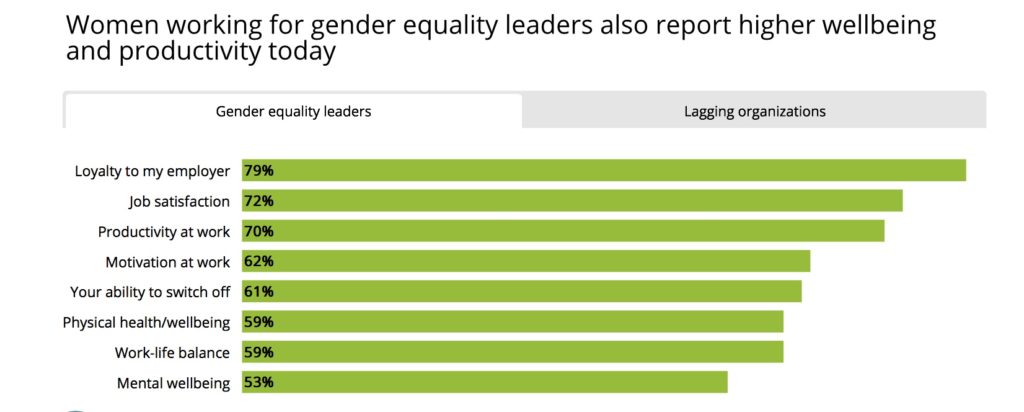Over half of working women around the world, are ‘significantly less optimistic’ about their future career prospects, according to a new study.
Heightened workloads and household responsibilities during the Covid-19 pandemic are driving deep dissatisfaction among many women in the workforce, according to a new report from Deloitte. The report, entitled Women @ Work: A Global Outlook, found that these increased responsibilities are having devastating effects on working women, with 51% of those surveyed ‘less optimistic’ about their career prospects today.
Additionally, over half of women surveyed have experienced harassment or non-inclusive behaviour at work during the past year. Another 77% say their workload increased since the Covid-19 crisis started. They also reported a 35-point drop in mental health; and a 29-point drop in motivation at work compared to before the pandemic. So it’s no wonder that the majority of women are planning to leave their current employer within two years; with nearly a quarter considering leaving the workforce for good, according to the report.
REGRESSING GENDER EQUALITY
Representing the views of 5,000 women across 10 countries, the research shows that gender equality has regressed during the pandemic, stifling years of slow, but steady progress. Increased responsibilities at work and at home during the pandemic, coupled with non-inclusive workplace cultures, are resulting in diminishing job satisfaction and employer loyalty for women.
Women are also reporting declining wellbeing and having to shoulder more responsibilities both at work and home. Since the pandemic began, 77% of women surveyed say that their workloads have increased; the most frequently-cited change in their lives brought on by the pandemic. Women are also taking on more responsibilities managing household and caregiving tasks. In fact, 59% say they’re spending more time on domestic tasks; 35% are spending more time caring for children; and 24% cite spending more time caring for dependents other than children.
As a result, the survey suggests that women’s wellbeing has fallen significantly since the pandemic: only one third of women consider their mental wellbeing today to be “good” or “extremely good,”; compared to 68% prior to the pandemic. With mental wellbeing on the decline, women around the world are concerned about the impact of their mental health on their career. Around 29% of women who said their career isn’t progressing as fast as they would like, point to poor mental health as a major contributing factor.

WOMEN FROM MINORIY GROUPS SUFFER MORE
According to the survey, women who identify as LGBT+ and/or women of colour were even more likely to report lower levels of mental wellbeing and satisfaction with work/life balance, compared to all respondents. Women also continue to experience non-inclusive behaviours in the workplace.
While many organisations tout their commitment to an inclusive workplace, many women are continuing to experience non-inclusive working environments. Over half of surveyed women say they have experienced some form of harassment or non-inclusive behaviour at work over the past year. This ranges from unwanted physical contact and disparaging remarks; to having their judgment questioned and being given fewer advancement opportunities because of their gender.
DISCRIMINATION & HARASSMENT
LGBT+ women are almost four times more likely to say they have experienced jokes of a sexual nature; and five times more likely to have experienced belittling comments about gender. One in 10 women of colour also said they have experienced comments about their race in the workplace. They are also more likely to have experienced comments about their communication style than White women (15% versus 5%). Most women who experience these behaviours do not report them to their employer, particularly the non-inclusive behaviours they feel are less “serious.”
A quarter of women cite fear of career reprisal as the top factor for not reporting these behaviours. In some cases, organisations don’t have the appropriate reporting mechanisms in place. In fact, only 31% of the women surveyed believe that their company currently has a process for reporting discrimination and harassment.

INADEQUATE WOKPLACE SUPPORT
As a result of inadequate workplace support, women are considering leaving the workplace, the report found. Only 22% of women believe their employers have helped them establish clear boundaries between work and personal time. Most women also feel like they have to be “always on” at work, and 63% feel that their employers evaluate them based on the amount of time they spend online versus the quality of their work.
The numbers are even more stark for LGBT+ and/or women of colour. Only 35% of LGBT+ women say their employer’s commitment to supporting women has been sufficient since the pandemic began; in comparison to 44% of non-LGBT+ women. Meanwhile, younger women of colour between the ages of 18-37 are more likely than the overall survey sample to feel less optimistic about their career prospects today than before the pandemic (58% versus 51%). They are also more likely to say their careers are not progressing fast enough (54% versus 42%).
The survey attributes the 29-point drop in job satisfaction to the “lack of support” available for many women. So it’s no surprise that 57% of women (and nearly 60% of women of colour) plan to leave their employer in two or fewer years, citing “a lack of work/life balance as the top reason”. Not only are many women questioning their current career prospects, but nearly a quarter are also considering leaving the workforce altogether.
PERFECT STORM FOR WORKING WOMEN
“The last year has been a ‘perfect storm’ for many women facing increased workloads and greater responsibilities at home, a blurring of the boundaries between the two, and continued experiences of non-inclusive behaviours at work,” stated Emma Codd, Global Inclusion Leader at Deloitte.
“While the adverse impact on women’s wellbeing, motivation and engagement is obvious, our research also shows that some employers are getting it right. The women who work for these organisations are more engaged, productive and satisfied with their careers,” added Codd. “As we start to rebuild workplaces for the future, we have a golden opportunity to get gender equality and inclusion right and avoid setting back years of progress.”

GENDER EQUALITY LEADERS
While the past year has undoubtedly been challenging for women, there are a group of employers who have doubled down on building inclusive cultures and supporting women’s careers. “Gender equality leaders”, representing the employers of roughly 4% of respondents, have created more inclusive and trusting cultures where women feel they are better supported.
The benefits of being a gender equality leader are clear:
- 70% of women who work for these leading organisations rate their productivity as “good” or “very good”; compared to just 29% of lagging organisations (defined as businesses with a less inclusive, low-trust culture, which make up 31% of the sample).
- 72% of women who work for gender equality leaders rate their job satisfaction as “good” or “extremely good”; compared with just 21% of women who work for lagging organisations.
- 70% of women who work for leading organisations plan to stay with their employers for two years or more; compared to a staggering 8% of women working for lagging organisations.

ADVANCING GENDER EQUITY
According to the report, there are several actions organisations can take now to address this critical issue, including prioritising work/life balance; and flexible working options that extend beyond workplace policies and are entrenched in the company culture; empowering women to succeed in life outside of work to enable success at work; and offering fulfilling development opportunities that build skills and expertise.
“Our survey respondents are clear about what needs to be done to reverse the pandemic’s disproportionate effects on working women,” commented Michele Parmelee, Global Deputy CEO and Chief People and Purpose Officer at Deloitte. “As organisations look to rebuild their workplaces, those that prioritise diversity, equity and inclusion in their policies and culture; and provide tangible support for the women in their workforces will be more resilient against future disruptions. Additionally, they will lay the groundwork needed to propel women and gender equity forward in the workplace.”

For more information about the report click here. Another recent survey revealed that gender equity is still ‘not a top priority’ for 70% of global companies, despite heightened awareness of the challenges facing women in the workplace driven by the Covid-19 pandemic. Click here to read more.







































